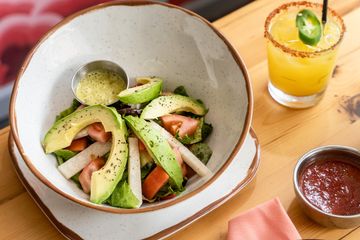Is Mexican Food Healthy And Balanced? Unpacking the Nutritional Conveniences of Typical Ingredients
The question of whether Mexican food is healthy and balanced welcomes an expedition of its typical active ingredients. Beans and corn work as fundamental staples, rich in healthy protein and fiber. Avocados provide valuable fats, while various herbs and seasonings add taste and health advantages - churros. Together, these components develop a tapestry of nutrition. However, the healthiness of Mexican cuisine commonly relies on prep work approaches and portion sizes. What function do these aspects play in determining its total dietary worth?
The Power of Beans: Healthy Protein and Fiber-Rich Staples
Although usually overlooked, beans act as a cornerstone of Mexican cuisine, using a wealth of dietary advantages. Rich in protein, they are a superb plant-based alternative for those looking for to meet their dietary protein needs. This high healthy protein material sustains muscle mass fixing and growth, making beans invaluable for both meat-eaters and vegetarians alike. Furthermore, beans are an exceptional resource of dietary fiber, which aids in food digestion and advertises a sensation of volume, potentially assisting with weight monitoring.
The range of beans utilized in Mexican dishes, such as black beans, pinto beans, and kidney beans, adds to a diverse taste account and can enhance dishes nutritionally. Beans are reduced in fat and consist of crucial vitamins and minerals, consisting of iron, folate, and magnesium. Together, these qualities make beans an important active ingredient, supplying both nutrients and sustenance in typical Mexican fare.

Corn: a Versatile Grain With Nutritional Advantages
Corn attracts attention as a versatile grain essential to Mexican food, celebrated not only for its cooking applications yet likewise for its outstanding dietary account. As a main ingredient in meals like tortillas, tamales, and pozole, corn gives important nutrients that add to a balanced diet regimen. Rich in carbohydrates, it acts as a significant energy resource, while likewise being low in fat, making it a beneficial option for different nutritional needs.
Corn is an excellent resource of dietary fiber, which helps in digestion and advertises satiation. It contains substantial quantities of vitamins such as B-complex vitamins, which are necessary for energy metabolic rate. The visibility of anti-oxidants, particularly carotenoids, adds to overall health and wellness by decreasing oxidative tension. Furthermore, corn is gluten-free, dealing with those with gluten level of sensitivities. In general, the nutritional benefits of corn emphasize its value in traditional Mexican food and its role in a healthy and balanced diet regimen.
Avocados: Healthy And Balanced Fats and Nutrients in Every Bite
Avocados play a substantial function in Mexican cuisine, matching dishes with their velvety texture and rich flavor. Past their culinary charm, avocados are celebrated for their impressive dietary profile. They are an abundant resource of healthy monounsaturated fats, which can assist reduced poor cholesterol degrees and support heart health. In addition, avocados are loaded with important nutrients, consisting of potassium, vitamin E, and B vitamins, adding to general wellness.
The high fiber material in avocados help digestion and promotes satiation, making them a helpful addition to any meal. Their distinct nutrient structure can Home Page additionally sustain skin wellness and supply anti-inflammatory advantages. Integrating avocados into traditional Mexican meals or enjoying them as a standalone treat can boost both taste and nourishment, showing why they are a precious staple in Mexican cuisine. In general, avocados supply a tasty way to delight in healthy fats and essential nutrients in every bite.

Herbs and flavors: Flavorful Health Boosters
While appreciating the abundant flavors of Mexican food, one can not overlook the important duty that spices and herbs play in enhancing both preference and wellness. Components such as chili, cilantro, and oregano peppers not only add to the dynamic taste profile however also supply significant health and wellness advantages. For instance, cilantro is understood for its purifying residential or commercial properties, helping to remove heavy steels from the body, while oregano is loaded with anti-oxidants and has anti-inflammatory effects.
Chili peppers, a staple in numerous Mexican recipes, have capsaicin, which has been linked to improved metabolism and discomfort relief. Furthermore, seasonings like cumin and coriander support digestion and might help in blood sugar level policy. Including these savory health boosters right into dishes not just improves the culinary experience yet also promotes total well-being, making Mexican cuisine not simply tasty, yet also nutritionally beneficial.
Conventional Food Preparation Methods: Enhancing Nourishment and Taste
Traditional food preparation approaches in Mexican food play a necessary duty in enhancing both nourishment and taste, as they frequently focus on fresh active ingredients and classic techniques. Methods such as nixtamalization, where see here now corn is soaked and cooked in an alkaline remedy, not just improve the nutrient profile of tortillas but additionally enhance their digestibility - freshly made guacamole. Furthermore, using slow-moving cooking techniques, like cooking or braising, allows tastes to fuse wonderfully while retaining the honesty of the ingredients

Frequently Asked Concerns
Are Mexican Food Portions Typically Larger Than Other Foods?
Mexican food portions are frequently larger than those of numerous other cuisines. This particular mirrors typical dining techniques, stressing public sharing and hearty meals, which can lead to a much more substantial offering size on the whole.
Just how Does the Prep Work Approach Affect Healthiness of Mexican Food?
Preparation approaches greatly influence the healthiness of Mexican food. Methods such as grilling or steaming protect nutrients, while frying can raise harmful fat material. Options of components and cooking styles ultimately determine overall dietary value.
Can Mexican Food Be Tailored for Particular Nutritional Limitations?
Mexican food can certainly be customized for specific dietary limitations. Substitutions, such as making use of corn tortillas for gluten-free diet plans or integrating even more veggies, enable individuals to enjoy conventional tastes while suiting different nutritional requirements.
What Are Typical Misunderstandings Regarding Mexican Food and Wellness?
Typical misconceptions concerning Mexican food consist of the idea that it is inherently unhealthy, overly zesty, and entirely concentrated on fats. In imp source truth, traditional meals usually feature healthy ingredients and can be tailored to various nutritional requirements.
Exist Much Healthier Alternatives at Mexican Restaurants?
Much healthier alternatives at Mexican dining establishments typically consist of grilled meats, beans, and fresh vegetables. Picking meals that highlight whole components and preventing hefty sauces can bring about a much more nutritious dining experience, advertising overall wellness.
The variety of beans utilized in Mexican dishes, such as black beans, pinto beans, and kidney beans, adds to a diverse flavor account and can improve dishes nutritionally. Avocados play a substantial role in Mexican cuisine, complementing meals with their creamy texture and abundant flavor. Integrating avocados into traditional Mexican recipes or appreciating them as a standalone treat can improve both taste and nourishment, demonstrating why they are a cherished staple in Mexican cuisine. While enjoying the rich tastes of Mexican food, one can not overlook the essential duty that spices and herbs play in boosting both taste and health and wellness. Standard cooking methods in Mexican cuisine play a necessary role in boosting both nutrition and flavor, as they usually prioritize classic strategies and fresh active ingredients.